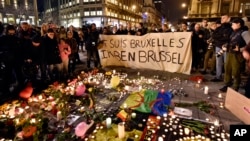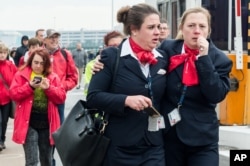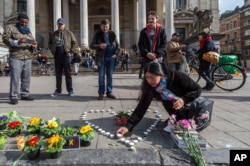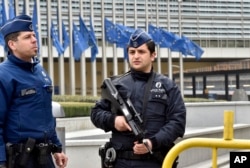The explosions Tuesday in Belgium's capital all happened within a few kilometers of the area that is home to the headquarters of NATO and the EU, the European continent's core institutions.
"Through these attacks in Brussels, it was all of Europe that was hit," wrote French President Francois Hollande on Twitter.
Hollande, like other European leaders Tuesday, offered support to Belgium's government. In televised remarks shortly after the attacks, the French leader said, "The war against terrorism has to be led by the whole of Europe."
But news of the attacks sent the value of the British pound tumbling Tuesday, reflecting concerns across Europe, analysts say, that the terror strike claimed by Islamic State militants may raise the risk of Britain's departure from the European Union.
Voters in Britain are scheduled to vote in June on whether their country, the EU's second-largest economy, should stay in the regional grouping, a decision that hinges largely on concerns over immigration and security.
"Concerns about immigration are already one of the key drivers underlying support for Brexit [Britain's exit from the EU]," said Florian Otto, a security analyst at Verisk Maplecroft, a Britain-based risk analysis company. "The attacks offer another opportunity to reframe the issue as a security threat."
Belgian vulnerability
The attacks exposed Belgium's long-known vulnerability to terrorist attacks. Official estimates last year said nearly 500 young Muslim residents have traveled to Syria or Iraq to join extremist groups, making it the European country with the highest number of foreign fighters per capita.
Belgium's small size has also meant that it has fewer anti-terrorism resources compared to larger nations like the United States, Britain or France.
In addition to a lack of resources, observers say institutional fragmentation and poor intelligence sharing have hampered Belgium's ability to counter terrorism.
"Brussels itself has 19 municipalities and six different police forces, which presents an obvious operational challenge," Benoit Gomis, a specialist on terrorism and European defense at Chatham House in London, told VOA.
Tuesday's attacks could spark a new, unified push to help Belgium boost its security infrastructure. In a statement Tuesday, EU leaders said they "are determined to face this threat together with all necessary means."
"Above all, it will be critical for the EU to substantively improve intelligence sharing among member states," Otto told VOA. The security analyst notes that measures were already agreed upon after last year's Paris attacks, which were largely organized in Belgium.
Analysts say Tuesday's attacks could see the idea of a joint EU intelligence unit put back on the agenda. Other areas include counter-radicalization efforts and combined operations to combat arms trafficking.
Such a coordinated approach could trigger opposition in some European governments that are already wary of EU overreach — one of the issues driving the desire among some in Britain to break away from the grouping.
Worldwide reaction
Leaders across Europe on Tuesday announced measures to boost security at borders and transit points, while joining others worldwide to strongly condemn the attacks.
In a televised statement from NATO headquarters in Brussels, Secretary General Jens Stoltenberg said NATO stands with its ally Belgium "on this dark day.”
He said this “cowardly” act with a “heavy” and “tragic” human toll is an attack on democratic values and open societies, adding that “terrorism will not defeat democracy and take away our freedoms.”
European Union Council President Donald Tusk said he was appalled by the attacks and offered Europe's support.
Tusk said that “these attacks mark another low by the terrorists in the service of hatred and violence,” adding that the EU “will fulfill its role to help Brussels, Belgium and Europe as a whole counter the terror threat” they are facing.
EU foreign policy chief Federica Mogherini cut short a news conference in Jordan Tuesday after saying that “today is a difficult day.”
‘Terrorists will never win’
France is still recovering from a series of terrorist attacks that rocked Paris last November. The main suspect of those attacks was arrested last week in Maelbeek, Brussels.
Following an emergency cabinet meeting in London, British Prime Minister David Cameron condemned the blasts and said that Europe should stand together against the terror threat. "We will never let these terrorists win," Cameron said at his Downing Street office.
German Chancellor Angela Merkel's chief of staff, Peter Altmaier, called for solidarity with Belgium, writing on Twitter that “terrorists will never win.” He added that “our European values [are] much stronger than hate, violence, terror!”
Russian Foreign Ministry spokeswoman Maria Zakharova said that the West's politics of “double standards” have led to terrorist attacks and that frozen diplomatic relations between NATO and Russia have slowed the fight against terrorism. The Kremlin, however, offered its condolences and expressed solidarity with Belgium after the attacks Tuesday.










